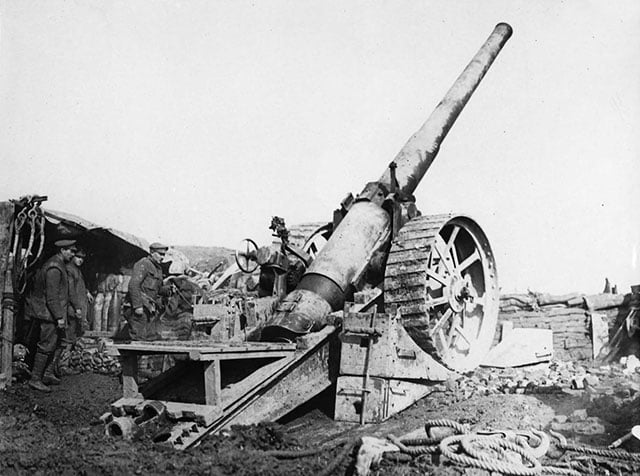Sonnet On Seeing a Piece of our Heavy Artillery Brought into Action
This sonnet (a poem of 14 lines) is by Wilfred Owen—perhaps the most famous of the First World War English poets. It concerns "a piece of our heavy artillery"—in other words a large gun or cannon.

Be slowly lifted up, thou long black arm,
Great Gun towering towards Heaven, about to curse;
Sway steep against them, and for years rehearse
Huge imprecations like a blasting charm!
Reach at that Arrogance which needs thy harm,
And beat it down before its sins grow worse.
Spend our resentment, cannon,-yea, disburse
Our gold in shapes of flame, our breaths in storm.
Yet, for men's sakes whom thy vast malison
Must wither innocent of enmity,
Be not withdrawn, dark arm, the spoilure done,
Safe to the bosom of our prosperity.
But when thy spell be cast complete and whole,
May God curse thee, and cut thee from our soul!
long black arm (noun): refers here to the barrel of the gun/cannon
towering (adjective): rising up (like a tower)
curse (verb): ask a supernatural power to inflict harm or punishment on someone or something
imprecation (noun): spoken curse
cannon (noun): very large gun
disburse (verb): pay out (money for example); spend
malison (noun): curse
wither (verb): (of a plant) become dry and shrivelled; (of a part of the body) become shrunken or wrinkled from age or disease
spoilure (noun): damage (this word is not in the English dictionary and appears to have been invented by Owen; there is debate as to its precise meaning)
bosom (noun): chest; heart
thy (possessive determiner): your (old English)
spell (noun): magic charm or incantation
cast (verb): (of a spell) be put into action; take effect
thee (pronoun): you [object] (old English)